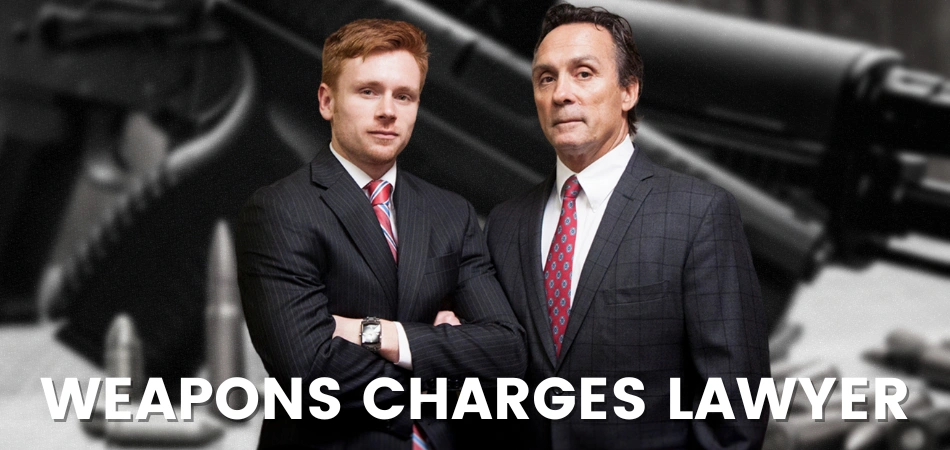Understanding the Consequences of Gun Charges in Missouri
Missouri is known to have some of the least restrictive laws regarding the possession of firearms by law-abiding citizens. Still, there are many complicated laws and regulations which can lead to a firearms-related charges ranging from misdemeanor to very serious felony charges.
Certain individuals don’t have the right to carry a firearm. Common examples include those who have been convicted of a domestic assault charge, and anyone who has been convicted of a felony but there is many scenarios in which someone may or may not be able to carry a firearm depending on their occupation, location, or history.
Below you will see an overview of Missouri law outlining some of the most common firearms-related charges which occur in Missouri.
We recommend bookmarking this page for easy reference.
Table of Contents
Quickly Navigate To A Specific SectionAs Seen On
Armed Criminal Action
Any person who commits any felony under the laws of Missouri by, with, or through the use, assistance, or aid of a dangerous instrument or deadly weapon is also guilty of the offense of armed criminal action and, upon conviction, shall be punished by imprisonment for a term of not less than three years and not to exceed fifteen years.
If the person is unlawfully possessing a firearm, in which case the term of imprisonment shall be for a term of not less than five years.
If convicted no person shall be eligible for parole, probation, conditional release, or suspended imposition or execution of sentence for a period of three (3) years.
Armed Criminal Action: Second Offense
Any person convicted of a second offense of armed criminal action shall be punished by imprisonment by the department of corrections for a term of not less than five years and not exceeding thirty years.
If the person is unlawfully possessing a firearm, the term of imprisonment shall be for a term not less than fifteen years. If convicted you will not be eligible for parole, probation, conditional release, or suspended imposition or execution of sentence for a period of five (5) years.
Armed Criminal Action: Third Or Subsequent Offenses
Any person convicted of a third or subsequent offense of armed criminal action shall be punished by imprisonment by the department of corrections for a term of not less than ten years.
If the person is unlawfully possessing a firearm, in which case the term of imprisonment shall be no less than fifteen years.
If convicted the person will not be eligible for parole, probation, conditional release, or suspended imposition or execution of sentence for a period of ten (10) years.

Unlawful Use of Weapons: A Misdemeanor to A Felony
Unlawful use of weapons charges are some of the most complicated criminal laws in Missouri with many exceptions and a huge variance in the severity of the penalty.
Some of the most common ways you see an unlawful use of weapons charge in Missouri are as follows:
Carrying Firearms where restricted by Law.
Using a firearm in an angry or threatening manner, or having a firearm or projectile weapon readily capable of lethal use on his or her person.
While he or she is intoxicated and handles or otherwise uses a such firearm or projectile weapon in either a negligent or unlawful manner.
Discharges such firearm or projectile weapon unless acting in self-defense; or
Discharges a firearm within one hundred yards of any occupied schoolhouse, courthouse, or church building; or
Discharges or shoots a firearm at a mark, at any object, or at random, on, along, or across a public highway or discharges or shoots a firearm into any outbuilding
Possession of Firearms and Drugs which are sufficient for a felony
Still, there are several other ways that you could be charged with unlawful use of weapons for a gun-related charge and you should contact a gun charge defense lawyer at the Krupp Law Firm for advice.
Possession of a Defaced Firearm: B Misdemeanor
Each firearm has a serial number typically located on the side of the gun. It's always supposed to be on each firearm. So, that it is regulated by the federal government, generally by the ATF (Bureau of Alcohol, Tobacco, Firearms and Explosives).
If the prosecutor wants to charge you with a firearm crime, they will run an ATF check on the serial number. That will tell them who is the registered owner of the firearm and when it was purchased.
A defaced firearm is anything that has scrubbed the serial number off of the firearm. Witling down, painting over or glazing over the serial number. Making it where the serial number is not visible or not identifiable. If the government tries to run the number and they can not because it is illegible or has been tampered with, it will be considered a defaced firearm.
If you know there is a defaced firearm around, you should be nowhere near it.
Felon near a defaced firearm
If you are a felon near a firearm, the government may or may not prove that you were not in possession of the firearm. If you are a felon near a defaced firearm, you have more incriminating evidence against you. It's not necessarily a strict liability crime that if you are in possession of a firearm and it's defaced you are outright guilty. But it is as close as you can possibly get.
All the prosecutor has to prove is that you had knowledge of it's existence in nature.
A person commits the crime of possession of a defaced firearm if he knowingly possesses a firearm that is defaced. There is also a charge for the act of defacing a firearm, which is an A misdemeanor but is a much less common charge.
Unlawful Possession of a Firearm: D Felony
Weapons Charges FAQ's
Felon in a Possession of a Firearm.
In Missouri, simply pleading guilty to a felony doesn’t always mean you’re a convicted felon. This is important to understand, especially since even some police officers can get it wrong. If you’re on probation and received a Suspended Imposition of Sentence (SIS), that’s not considered a conviction. You may have pled guilty, but you’re not officially a convicted felon under Missouri law unless the conviction is finalized.
To be charged with felon in possession of a firearm, two things must be true: you must be a convicted felon, and you must have possession of the firearm. Without both of these factors, a charge may not hold up in court.
Actual Possession and Constructive Possession.
In Missouri, possession of a firearm isn’t as straightforward as it may seem. There are two types of possession: actual possession and constructive possession. Actual possession is what most people think of—physically holding the firearm. However, constructive possession is where things can get tricky.
Constructive possession means you don’t have to be holding the firearm, but it’s within your presence or control. For example, if you're the only person in a vehicle and a firearm is found inside, a jury might assume you possess it, even if it’s not directly on you.
However, that assumption isn’t always enough to convict. Prosecutors still have to prove you knew the firearm was there. If you were driving someone else’s car and the firearm was hidden in the trunk under things that aren’t yours, it becomes harder to prove you were aware of its presence. Even though the law might allow them to argue constructive possession, they must still show beyond a reasonable doubt that you knew about the firearm.
Understanding the difference between these two types of possession is key to defending yourself in cases involving illegal firearms or other possession-related charges.
Can a Felon Live in a Home With a Firearm?
If you’ve been convicted of a felony, it doesn’t automatically take away another person’s constitutional right to own a firearm. For example, if a husband owns firearms and his wife is a convicted felon for a non-violent crime, like theft, the wife typically wouldn’t be punished just because the husband is exercising his Second Amendment right to own firearms.
However, the situation can get complicated if the felon is in close proximity to the firearms. If the felon appears to have control over the firearms or is found to be handling them, it may be possible to prove that they were in possession, which could lead to legal issues. While the law doesn’t guarantee certainty, it’s important to understand that living with someone who owns firearms could still pose legal risks for a convicted felon.
How Can They Prove I Am in Possession of a Firearm?
When it comes to proving possession of a firearm, proximity and access are key factors. If you're the sole occupant of a vehicle and a firearm is found in places like the center console, the driver’s side floor, or the side pocket, it’s likely the police and prosecutor will argue that you had control over it.
However, it's not always a guarantee. While the prosecution may present evidence to suggest you had access to the firearm, it’s still possible for a jury to question that. I’ve handled cases where the evidence didn’t hold up, and the jury didn’t believe the defendant had possession. The main things they look at are how close you were to the firearm and whether you could reasonably access it. These details can make a big difference in your case.
How Can They Prove I Am in Possession of a Firearm?
In general, felons are not allowed to possess firearms. However, there are rare exceptions, such as situations involving self-defense. For instance, if a felon were to act in self-defense during an extreme situation, like stopping an active shooter, it’s possible they could technically be charged with unlawful possession of a firearm, but it’s unlikely. The law tends to be gray in these scenarios, and while the person could be charged under Missouri law, it’s rare for charges to actually be pursued in life-threatening situations.
Missouri law states that it’s illegal for a felon to knowingly possess a firearm. This also applies to individuals who are fugitives, habitually intoxicated or drugged, or currently deemed mentally incompetent. However, even with these restrictions, certain real-life situations may result in exceptions being considered.
How Krupp Law Firm Helps Your Case
The gun charge defense lawyers at Krupp Law Firm are experienced with gun-related charges. They are able to look at the evidence in your case and determine your strengths and weaknesses and whether your case should be taken to trial.
Contact a gun charge lawyer for St. Louis and St. Charles at the Krupp Law Firm for a free consultation on how to best proceed with your case.

Attorney Ryan Krupp
If you're facing gun charges, attorney Ryan Krupp is the criminal defense attorney you need. With firsthand experience as a former prosecutor, Ryan knows how the other side works and uses that knowledge to build a strong defense for you. His background handling a wide range of criminal cases—including domestic violence, assault, drug offenses, and juvenile cases—gives him unique insights into defending weapons charges.
Born and raised in St. Louis, Ryan is deeply committed to helping people in his community get the justice they deserve. He has a proven track record of success in court, with acquittals, dismissals, and wins on appeal.
At Krupp Law Firm, you can trust that Ryan Krupp will fight for the best possible outcome in your case.
Attorney James Krupp
If you’re facing gun charges in Missouri, attorney James Krupp is here to help. With over 30 years of legal experience, James has a deep understanding of Missouri law and the St. Louis area. He has successfully handled a wide range of cases, including criminal defense, and is known for his strong commitment to helping people through tough legal situations.
Clients trust James for his kindness, clear communication, and proven results. His background, from hosting lawyer radio programs to winning cases in court, makes him the right choice if you need a solid defense for weapons charges. At Krupp Law Firm, James Krupp will fight to protect your rights and your future.

Municipal Courts
Take The Next Step and request your free consultation.
Use the form below to email or call us at (314) 835-9999














